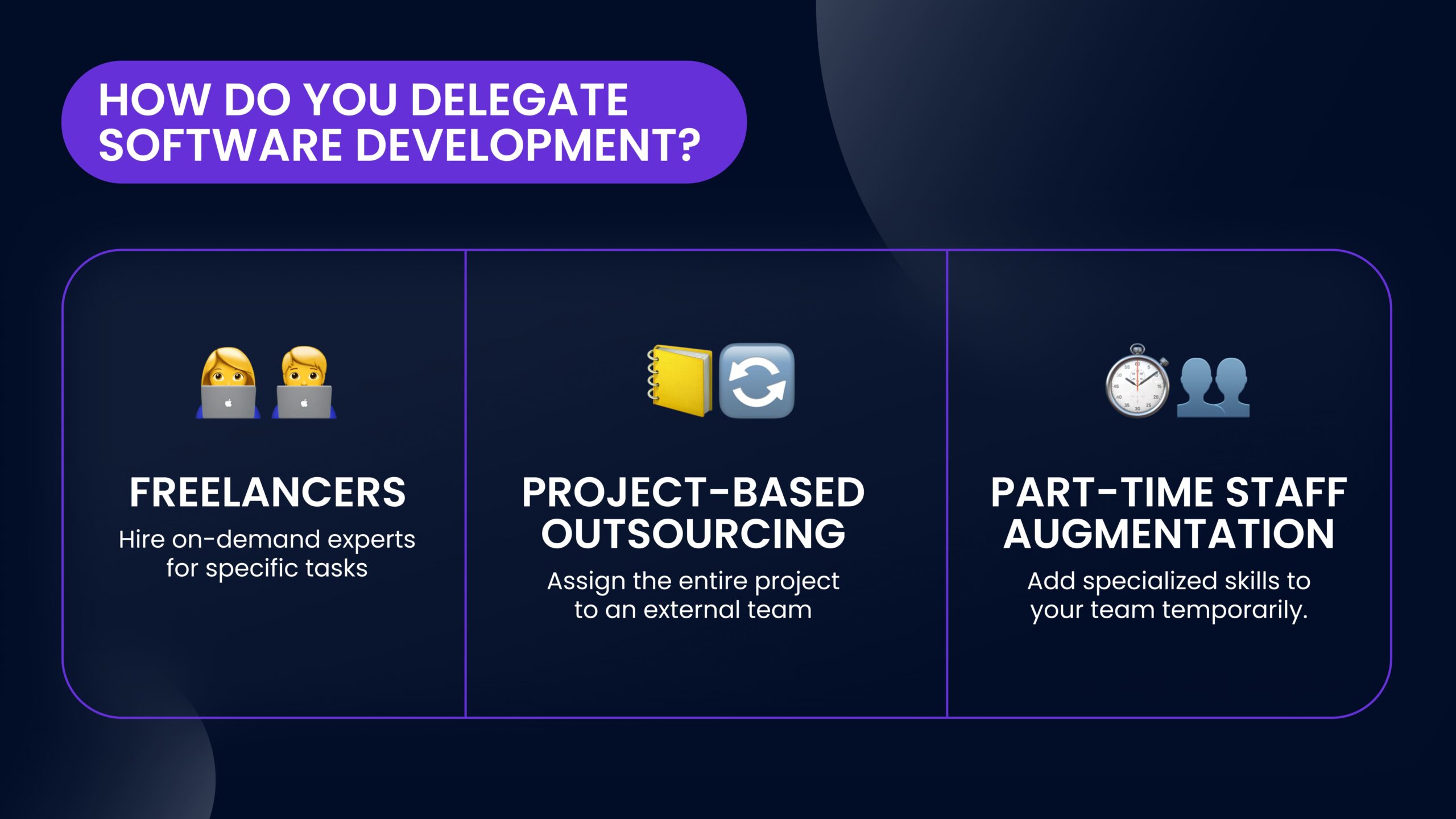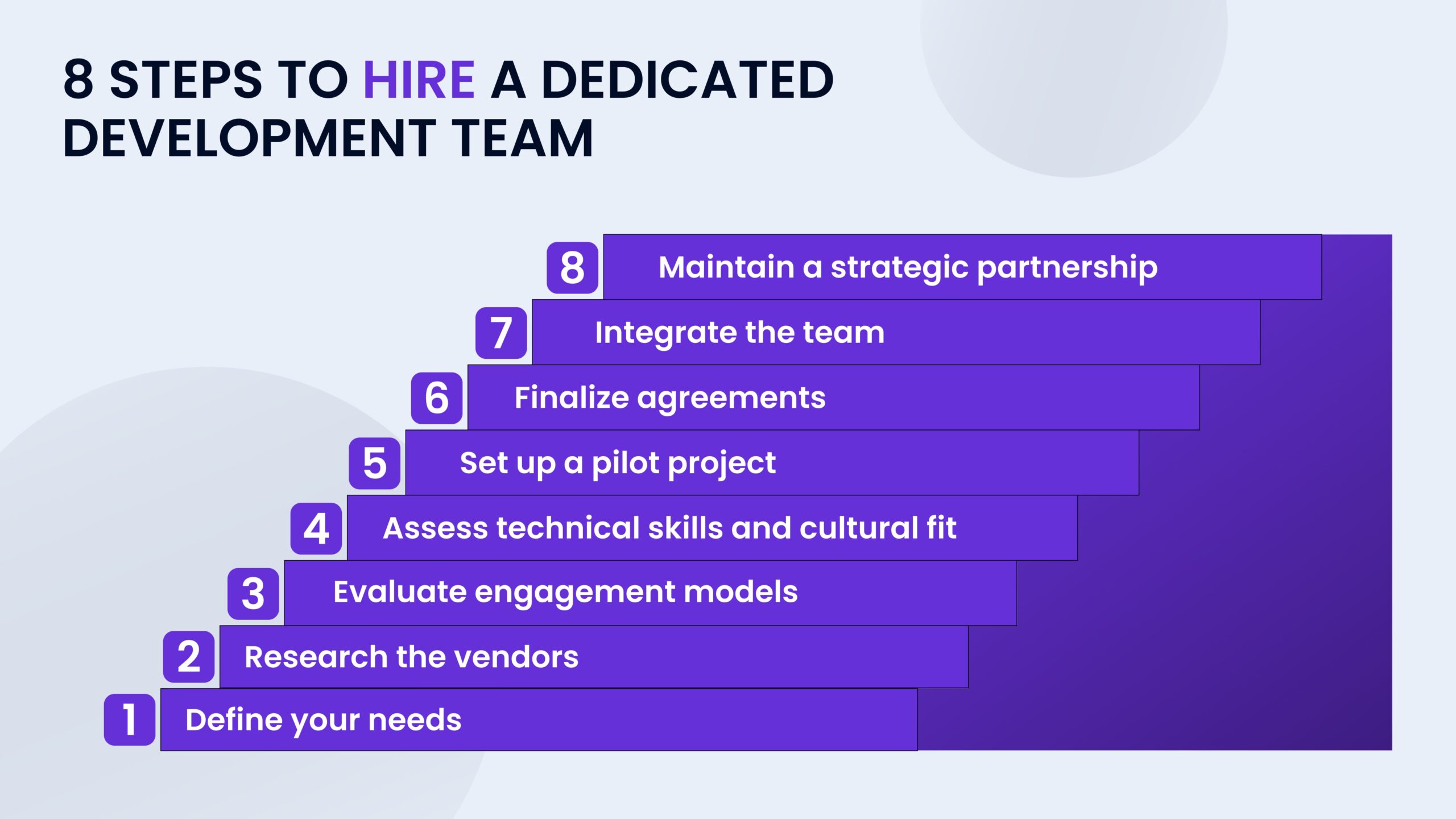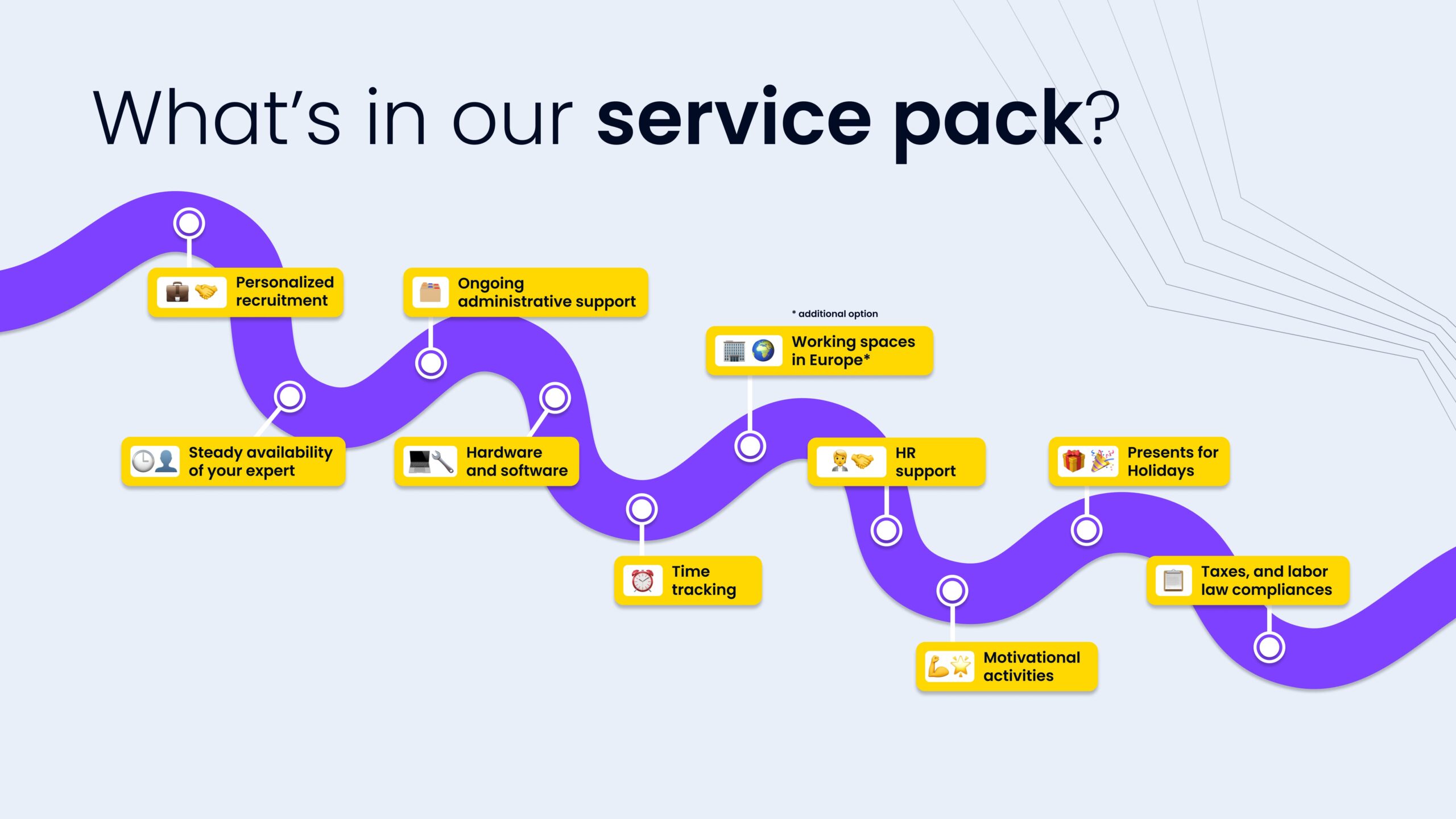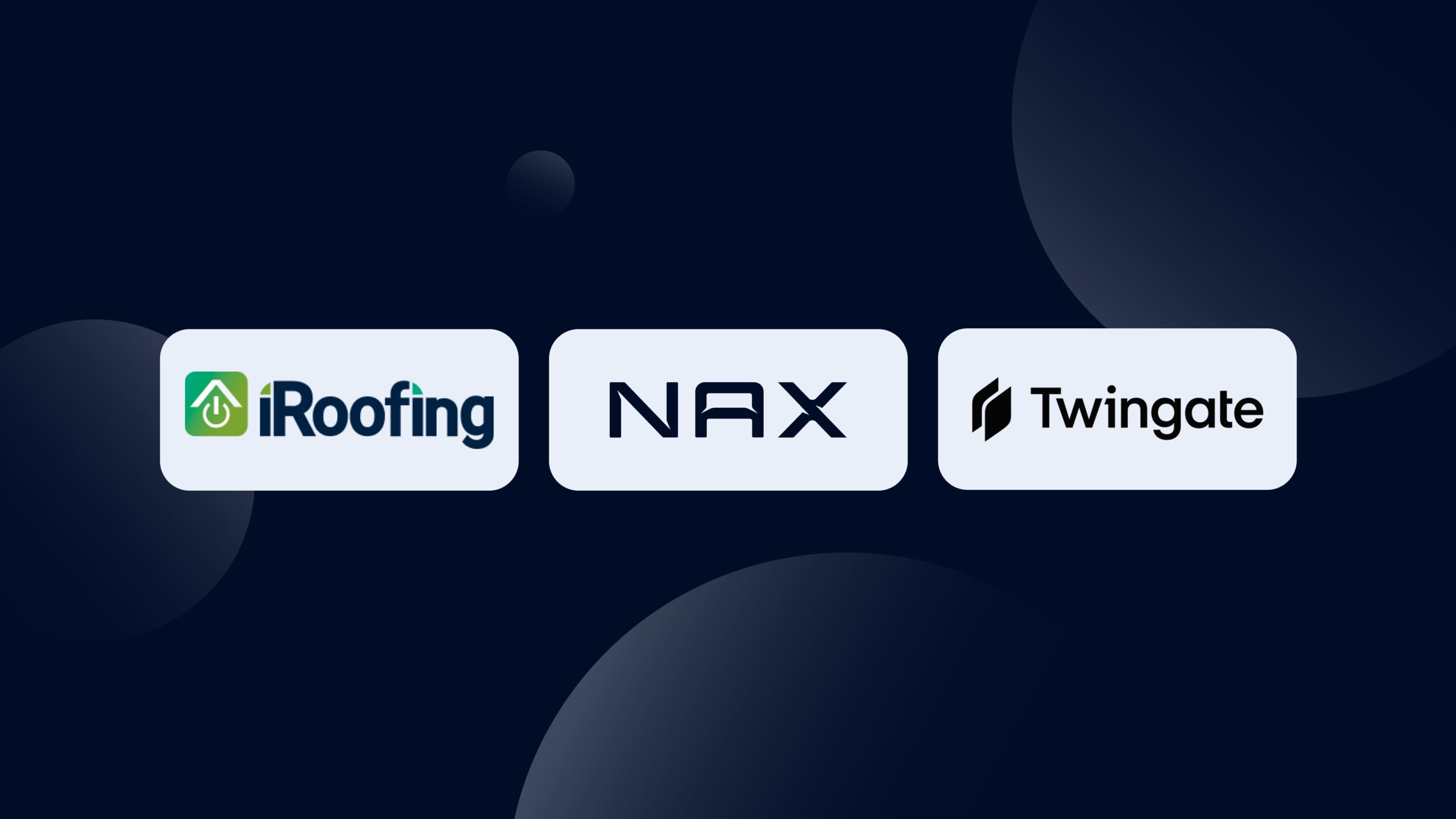
Sometimes, you don’t have time or money to hire new employees to work in your office. In-house staff is expensive in all respects, and assembling a good team can take over 45 days. In these cases, you might find that a dedicated development team can be an option. With a dedicated team, you can extend your in-house staff on a budget. Unlike traditional outsourcing, this team aligns with your company’s goals and offers the same focus and commitment as your own employees.
Content:
- Why should you choose dedicated development team services?
- Steps to take to hire a development team
- How to identify reliable providers?
- Strategies for smooth onboarding of a dedicated development team
What makes a dedicated team an option for many businesses is its adaptability, as when you hire such team, you get a tailored group of skilled engineers just for your needs. This model suits companies tackling complex projects or growth, providing technical skills, strategic insights, and scalability.
Why should you choose dedicated development team services?
A dedicated development team is ideal when you need specialized skills, long-term support, or seamless integration into your projects. With a team like that, you get professionals focused only on your project. But is this exactly what your company needs right now? Check out some other alternatives to a dedicated development team.
Other options for development teams

- Freelancers. They are flexible, cost-effective, and well-suited specialists for short-term or smaller projects. Pros? It’s the most affordable way to develop software. Cons? You can never be sure of the quality, plus all the management and organizational questions are on you.
- Project-based outsourcing. With this model, you hand over the entire project to an external team. This approach works perfectly for self-contained projects requiring minimal control over the process. If you need close integration and flexibility from your remote team, though, or your project requires rapid changes and flexibility, traditional outsourcing should not be your choice.
- Part-time staff augmentation. Want to check if outstaffing works for you? Don’t need a full team for an extended period? Hire an individual dedicated developer for part-time engagement from a reliable IT outstaffing vendor.
And there is also an in-house hiring. This approach is the most popular one for a reason – it gives you full control over the development process and helps create a specific innovative vibe in your offices. It goes with one, yet important, drawback – this is probably one of the most expensive approaches to software development, especially if you’re located in regions with high wages, like Israel or the US.
What makes dedicated development teams stand out?
Dedicated development teams offer a “best of all worlds” approach – it gives you access to a global pool of talent without the full cost and responsibility of in-house hires. IT vendors providing staff augmentation services adapt to your needs, and their teams integrate with your workflows, so you receive ongoing collaboration, continuity, and immediate response to changing project needs.
This model is perfect if you have complex, evolving projects that need consistent support, scalability, and expertise. It is also great if you’re a small startup without a strong HR brand and need some external backup to attract top specialists.
Steps to take to hire a development team
Here’s a quick guide on how to hire a development team from a staff augmentation vendor. Be sure to follow every step for the best results!

1. Define your needs
Start by defining the objectives, scope, and requirements of your project. Consider the specific features, technologies, and deadlines to drive the project forward. Next, determine the core qualities and experience you need in a team. All this will help you evaluate the candidates and choose the right team.
2. Research the vendors
Conduct thorough research on potential development providers. Look for companies with proven experience in your industry (for example, check out Clutch reviews and case studies, and verify that they have experience in handling projects of your scale and complexity. Shortlist a few that meet your criteria for further evaluation.
3. Evaluate engagement models
Discuss available engagement models (time-and-material, fixed-price, or dedicated team setups) and their costs. Does the pricing structure align with your budget? Pay attention to more affordable options, like part-time staff augmentation or IT recruiting.
4. Assess technical skills and cultural fit
When you narrow down potential teams, it’s time to evaluate their technical skills and if they fit your company culture. Test their skills through technical assignments and hold interviews to understand their approach and teamwork style.
5. Set up a pilot project
You don’t have to sign a year-long contract all at once! Ask if the vendor of your choice has a trial option, and if not – start with a pilot project to understand how the team works in practice. This trial run can reveal insights into their problem-solving skills, communication, and overall collaboration before committing to a long-term arrangement.
6. Finalize agreements
Once you’re satisfied with a team, discuss contract details, including project milestones, deliverables, intellectual property rights, confidentiality, and compliance. This ensures clarity and protection for both sides throughout the collaboration.
7. Integrate the team
Integrate your new development team into your workflows and set up communication channels and project management tools to maintain clear, efficient collaboration. Establish regular check-ins and reporting processes to monitor progress and maintain alignment with your project goals.
8. Maintain a strategic partnership
Finally, build a strong relationship by keeping communication open and asking for feedback. Stay connected with your dedicated team vendor—they are your strategic partner.
Talking about vendors…
How to identify reliable providers?
So, you’ve already checked their reputation and verified their expertise, right? It’s time to take some additional steps to confirm your IT vendor can be a reliable partner for your growth. Opt for vendors who believe in strategic partnership and are willing to stay with you at all times.
First, take a better look at their screening processes. Understand how the provider selects candidates – they should have a clear process for sourcing, interviewing, and evaluating candidates. This ensures the candidates they offer have the right skills and are a good fit for your company.
Second, check if they are really flexible and able to scale your team. Good providers offer flexible staffing solutions. They should be able to adjust to your changing needs, whether you need to increase the team quickly or change the skill sets of the people you hire.
Third, establish good communication practices. The provider should keep you updated on the recruitment process, including the status of candidates and any challenges. You should also have a clear understanding of the contract terms, costs, and expectations.
Make sure that you know what you will get. For example, here is a summary of what we do for all our clients:

So, you’ve chosen your strategic partner, and they offered you a top dedicated team. The offer is made, and all agreements are signed. What’s next?
Strategies for smooth onboarding of a dedicated development team
Now, it’s your turn to make things work. It is true that your staff augmentation vendor onboards your new hire – they make sure your dedicated team has all the necessary tools, office spaces, contracts signed, and financial and law documentation in check.
Check out eight steps to take for a smoother onboarding of your remote dedicated development team inside your business:
1. Communicate your expectations
Right from the start, ensure that all team members understand their roles, responsibilities, and project goals. Outline expectations clearly, including timelines, quality standards, and communication protocols.
2. Have a structured onboarding plan
Develop a well-structured onboarding plan that includes training on tools, workflows, and company culture. Familiarize the team with internal systems, software, and platforms they’ll use. Double-check that they understand the processes to be followed.
3. Integrate them into your company culture
Explain the day-to-day culture, values, and mission of your company to your remote team. Try stay transparent and honest. Also, introduce the newcomers to key team members via virtual meetups, or immersion in collaborative tools and platforms. A sense of belonging fosters a more cohesive and motivated team, which is essential for long-term success.
4. Establish communication channels
Agile or Scrum methodologies assume you have all the regular meatings in check. Don’t get too fancy – chat platforms like Slack and project management tools like Jira may be suffice. Don’t forget to provide access to your remote team to all the resources they might need to stay in constant contact with your internal employees.
5. Provide access to necessary resources
A bit of operational management – check and double check if your dedicated team has all the tools and resources they need, like software, access to servers, and documentation related to your product. A skilled staff augmentation vendor will give you a check-list and control the process on their side.
6. Offer continuous support and feedback
Onboarding doesn’t end after the first week. Provide ongoing support to help your dedicated team adjust to the new work environment. Schedule regular check-ins to address concerns, provide feedback, and make adjustments where needed. MWDN provides regular one-on-ones on their side, but you might need more technical meetings as well.
7. Foster collaboration and team building
Motivate your in-house employees to communicate with the dedicated development team. Let them see your new reinforcement as palls, not outsourcing vendors. Arrange joint brainstorming sessions, code reviews, and team-building activities to integrate everyone.
8. Define success metrics
Set clear, measurable goals for both the onboarding process and the overall project. This helps both you and the team understand what success looks like and ensures everyone stays focused on delivering value quickly.
MWDN success stories

Assembling dedicated teams is a great part of MWDN’s service pack. Even though we provide part-time solutions and hire individual specialists for our clients, these are dedicated teams in which we take pride! Here are some examples!
Twingate
For this US-based cybersecurity platform, we assembled a team of five developers who operated from an office in Eastern Europe. Over four years, they played a vital role in helping Twingate grow its client base and revenue. This collaboration not only proved fruitful for Twingate but also enriched our developers with cutting-edge expertise in cybersecurity and gave our recruiters invaluable experience in thorough, credential-based hiring.
iRoofing
For this leading roof manufacturing company, we assembled a team of nine experts who contributed to the product’s development for over a decade. With our team’s expertise, the company created a user-friendly app that bridges roof manufacturers, vendors, and clients—streamlining connections and fostering growth in the industry.
NAX technology group
This US-based FinTech client approached us at their inception. We supported them in designing prototypes for their very first apps. Over three years, we built a team of nine tech specialists tailored to their needs. Our collaboration laid a solid foundation for their growth, and we remain trusted partners to this day.
Content
- 0.1 Why should you choose dedicated development team services?
- 0.2 Steps to take to hire a development team
- 0.3 How to identify reliable providers?
- 0.4 Strategies for smooth onboarding of a dedicated development team
- 0.4.1 1. Communicate your expectations
- 0.4.2 2. Have a structured onboarding plan
- 0.4.3 3. Integrate them into your company culture
- 0.4.4 4. Establish communication channels
- 0.4.5 5. Provide access to necessary resources
- 0.4.6 6. Offer continuous support and feedback
- 0.4.7 7. Foster collaboration and team building
- 0.4.8 8. Define success metrics
- 1 MWDN success stories



